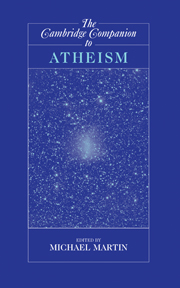Book contents
- Frontmatter
- General Introduction
- Part I Background
- Part II The Case against Theism
- 4 Theistic Critiques of Atheism
- 5 The Failure of Classical Theistic Arguments
- 6 Some Contemporary Theistic Arguments
- 7 Naturalism and Physicalism
- 8 Atheism and Evolution
- 9 The Autonomy of Ethics
- 10 The Argument from Evil
- 11 Kalam Cosmological Arguments for Atheism
- 12 Impossibility Arguments
- Part III Implications
- Index
- Series List
10 - The Argument from Evil
from Part II - The Case against Theism
Published online by Cambridge University Press: 28 January 2007
- Frontmatter
- General Introduction
- Part I Background
- Part II The Case against Theism
- 4 Theistic Critiques of Atheism
- 5 The Failure of Classical Theistic Arguments
- 6 Some Contemporary Theistic Arguments
- 7 Naturalism and Physicalism
- 8 Atheism and Evolution
- 9 The Autonomy of Ethics
- 10 The Argument from Evil
- 11 Kalam Cosmological Arguments for Atheism
- 12 Impossibility Arguments
- Part III Implications
- Index
- Series List
Summary
Where was God? Where was the intelligent designer of the universe when 1.5 million children were turned into smoke by zealous Nazis? Where was the all powerful, all knowing, wholly good being whose very essence is radically opposed to evil, while millions of children were starved to death by Stalin, had their limbs chopped off with machetes in Rwanda, were turned into amputees by the diamond trade in Sierra Leone, and worked to death, even now, by the child slave trade that, by conservative estimates, enslaves 250 million children worldwide? Without divine justice, all of this suffering is gratuitous. How, then, can a wholly good, all-powerful God be believed to exist?
The existence of evil is the most fundamental threat to the traditional Western concept of an all-good, all-powerful God. Both natural evil, the suffering that occurs as a result of physical phenomena, and moral evil, the suffering resulting from human action, comprise the problem of evil. If evil cannot be accounted for, then belief in the traditional Western concept of God is absurd.
THE ARGUMENTS
To address the problem of evil, arguments have been formulated to highlight the apparent contradiction generated by the existence of an omnipotent, omnibenevolent being and the abundance of evil, or gratuitous suffering, in the world. These arguments from evil do not argue against the existence of God per se, but do argue that a particular concept of God fails; namely, one that possesses the attributes of omnipotence, omniscience and omnibenevolence. Arguments from evil rest on the claim that there is an inconsistency of one sort or another – either a blatant contradiction or evidence to the contrary – between the claims about God and the facts of the world.
- Type
- Chapter
- Information
- The Cambridge Companion to Atheism , pp. 166 - 181Publisher: Cambridge University PressPrint publication year: 2006
- 1
- Cited by

